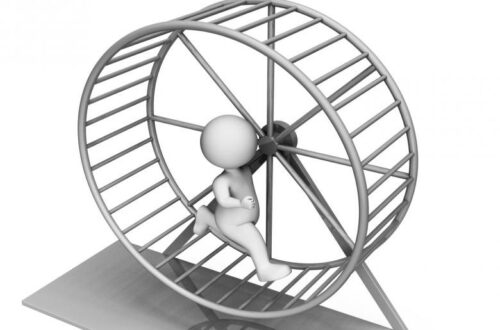
Forget being who you are. Life’s about becoming who you want to be
You may recognize this: To friends, family or colleagues you can’t refrain from stressing that you “want to be yourself”, and meanwhile you silently ask yourself, “Who am I actually?” If so, then you are not alone; many people struggle with that question. They search for their identity, or, as it is often worded, they are “searching for themselves”. They do self-examination, consult self-help books and read feel good magazines, or seek professional help to discover who they are “deep down”.
Trying to understand who you are can certainly be very helpful and valuable. “An unexamined life is not worth living”, the Greek philosopher Socrates appears to have said. And for those looking for an answer to the question “who am I?” of course it sounds very attractive that all those self-help books and feel good magazines promise to help you “discover who you are”, “become who you are” and “be who you really are”.
In practice, however, it usually turns out not to be that easy to put your finger on who you actually are. And that is not surprising, people are far too complicated creatures. The risk of asking “who am I?” is that you keep running in circles endlessly, looking for yourself, without finding yourself. In addition, I believe, the question “who am I?” is actually the wrong question. Let me explain that:
First of all: Who you are is not static. “Being who you are” suggests that your personality, your identity, is something static, as if “being” is some kind of permanent state. But that is not consistent with one of the most fundamental properties of “being”, namely that it is a process. That process started at your birth and ends at your death and in between you develop continuously. “Being” is something dynamic. You are by nature a dynamic being.
Second: Who you are is not completely under your control. You have no influence on when you were born, at which time in history, which in part determines your existence. You also have no influence on where you were born, on which continent, in which country and in which culture. You also have no influence on who your parents are, whose genes you inherited and on whom you depended your first years of life. And yet all of those things affect who you are. So who you are is not a completely free choice.
For this reason alone, many self-help books and feel good magazines are dangerously misleading. They assume that people can shape themselves according to their own wishes and that you can become whoever you want. And by doing so they deny that we can’t choose just everything, philosopher Roman Krznaric also warns: “Let’s not succumb to the self-help fantasy that we can all become anything we want, and everything we want is up for grabs. The choices we have and the opportunities we get are limited by our circumstances. ”
Those circumstances also include the experiences you have had over the course of your life and which have shaped you. I sometimes say: “You are the sum of your experiences” (a sum which is constantly changing). Everything you experience during your life affects your development. Therefore, who you are at this moment cannot be separated from your past.
The future is open and offers many possibilities from which you can choose. And it is those choices – your choices – that determine who you will become.
Behind the question “who am I?” there is often a hidden question: What should I do? How am I supposed to live? The idea is that if you know who you are, you will also get an answer to the question of what to do. This thought implies that man has an essence, that we have a kind of fixed identity that has a predetermined life path to follow. Just as an acorn is destined to become an oak tree, every person would also be destined to become “themselves”.
But that analogy does not hold. Who you are is not the result of a preconceived plan. You have become who you are right now due to a number of factors that you have no influence on (your genes, your environment), but also because of the choices you have made in your life. That in a sense makes your existence contingent; you could also have been someone else, if circumstances had been different, or if you had made different choices.
So you can dig whatever you want, but you will not find a predestined self. Let alone a guide to how to live. The ‘I’ in “who am I?” is not something tangible. There is no blueprint, model or manual stored anywhere inside that you just need to find in order to find out the answer to the question “who am I?”
French philosopher Jean-Paul Sartre did not believe that people have an essence either. According to Sartre, there is no such thing as an ‘I’ in the sense of a fixed identity. Instead, our essence is something we continuously strive for, which we shape throughout our lives. That is why Sartre said: “existence precedes essence”. First we start to exist and then we start to make something of ourselves. I think Sartre was right. Instead of being ourselves we are always becoming ourselves, creating ourselves. And with that I come to the most important point:
It’s not about who you are at all! It’s about who you want to be, or even better, it’s about who you want to become. You don’t necessarily have to put up with how things are now and remain who you are at the moment for the rest of your life. In fact, that is not possible at all, because you will change by definition. The only question is: in which direction? Your past is fixed, you cannot change that anymore, but the future is open and offers many possibilities from which you can choose. And it is those choices – your choices – that determine who you will become. (Within the given circumstances, of course.)
This is a fundamentally different approach to the search for your identity. Instead of focusing on who you are at this moment, and the circumstances, choices, and experiences that contributed to it (although certainly interesting and worth investigating!), focus on the future. Who do you want to become? “The significant tense for human beings is the future”, says existential psychologist Rollo May, “that is to say, the critical question is what I am pointing toward, what I will be in the immediate future.”
It is good to realize that this approach is in line with how people naturally are. People are by definition future-oriented. We make plans, have dreams, we look forward to things. Everything we do is focused on something in the future. Whether we start training because we want to practice a certain profession, book a holiday, or get groceries in order to eat in the evening. So by nature we are already permanently ‘becoming’ instead of ‘being’. “Personality can be understood only as we see it on a trajectory toward its future,” says May, “a man can understand himself only as he projects himself forward.”
A quote by George Bernard Shaw shared widely on social media reads, “Life is not about finding yourself, it’s about creating yourself.” And I couldn’t agree more. So my advise: don’t ask yourself “Who am I?” Instead, ask yourself: “Who do I want to become?”




